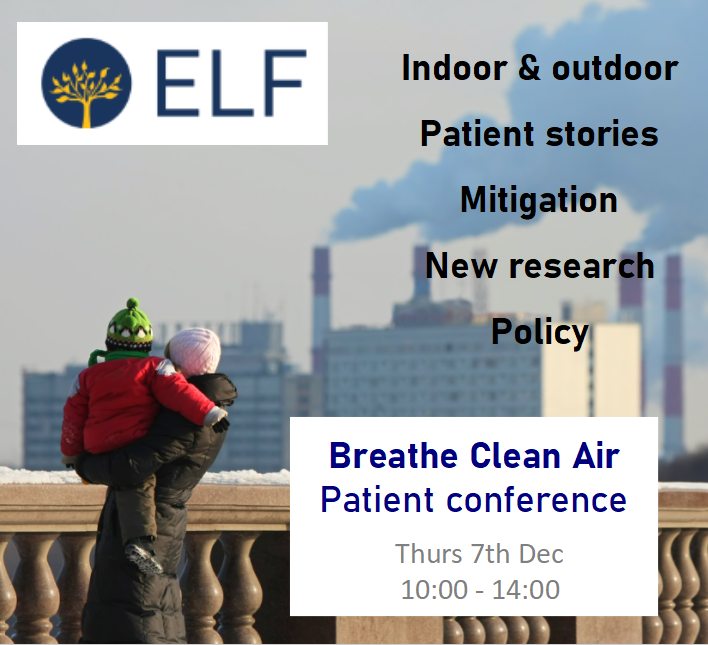Last week the European Lung Foundation held their first Air Pollution and Climate Change patient conference, where people came together to share personal experiences and hear about the latest research. All recordings are available to watch on demand via their YouTube channel, including moving personal stories from Tessa Jelen (Breathe Easy Westminster) and Rosamund Adoo-Kissi-Debrah (mother of Ella Roberta)
This will hopefully be the first in a series, so keep watching their website for dates of future meetings (it’s free and online). ELF organise many patient advocacy activities and also hold patient conferences for topics such as bronchiectasis, pulmonary fibrosis and asthma.

How can we improve indoor air quality at home?
Many aspergillosis patients find their symptoms are aggravated by poor air quality within the home, especially if they have related conditions such as asthma or COPD. Cigarette smoke and damp/mould are obvious sources, but problems can also be caused by the products we use to keep our homes smelling nice.
Triggers vary greatly from person to person and the scientific data on this subject is currently quite incomplete, so people are often not believed. Family, friends and even shops can be very reluctant to believe that their air fresheners and scented candles could be harmful. If you have problems with family and friends doubting, try sharing this infographic
- Damp and mould are hazardous to health and should be minimised for everyone, particularly children and those with lung conditions. NICE (NHS) issued guidelines for professionals in 2021 that give specific recommendations for doctors, construction and local authorities. Shelter provide a guide for people living in damp rentals or council housing.
- Gas cookers release particulates that should be removed by using an extraction fan (remember to change the filter regularly!) and opening a window for 10 minutes after cooking. If you are replacing your cooker, consider switching to electric/induction hob
- Scented candles and incense produce large amounts of particulates and should not be used regularly, especially in small, poorly-ventilated rooms like bathrooms
- Volatile organic compounds (VOCs) can be found in cleaning products and deodorant sprays
How can we improve outdoor air quality for everyone?
Unfortunately many aspects of air pollution are beyond our individual control, so it is also important for lung patients to come together and advocate for better laws and protections.
- Attend future ELF patient conferences
- Get involved in Healthy Lungs for Life
- Become an ELF clean air advocate
- Watch out for ELF activities at the European Respiratory Society medical conference (Sep 2024)
- Follow ELF on X (formerly Twitter)
Share this post
Latest News posts
Patients and Carers meeting September 2013
January 10, 2019
Patients and Carers meeting August 2013
January 10, 2019
Patients and Carers meeting July 2013
January 10, 2019
Patients and Carers meeting June 2013
January 10, 2019
Patients and Carers meeting May 2013
January 10, 2019
Film: Faces From The ICU
December 13, 2018
Tribute to Steph Smith – October 2010
December 6, 2018
Avoiding Respiratory Infections
November 29, 2018
News archive
- Antifungals in development
- COVID-19
- Events
- Fundraising
- General interest
- How do I...?
- Information and Learning
- Latest research news
- Lifestyle and Coping Skills
- Living with Aspergillosis
- NAC announcements
- News archive
- Patient and Carer Blog
- Patient stories
- Recordings
- Supplements and complementary therapies
- Types of aspergillosis
- Video
